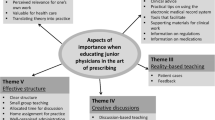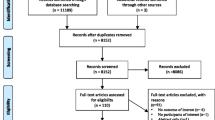Abstract
Background
Interactions with pharmaceutical companies influence physicians’ prescribing behavior. Less than half of US family medicine residency programs have educational curricula addressing their influence. However, medical students have extensive exposure to pharmaceutical industry marketing during their early years of training. We developed a successful and required active learning curriculum for medical students during their first-year of medical school.
Methodology
A philosopher bioethicist lectured to first-year medical students on the ethical issues surrounding the interactions with pharmaceutical representatives and outlined the three principles approach to clinical ethics as presented in the American Board of Internal Medicine Physician Charter (2002). The lecture also described the eight physician types offered by Fugh-Berman et al. Students watched two fictitious physician-pharmaceutical representative interactions. To promote active learning, students were provided a 3 × 3 Bingo card with each physician type. The bioethicist facilitated a discussion addressing the interactions.
Results
Two hundred twenty-nine first-year medical students participated in this required intervention. Fifty-two percent of first-year medical students had already interacted with pharmaceutical representatives. The session changed students’ opinions of pharmaceutical representatives and their ability to identify strategies to mitigate their influence. Students articulated ethical issues involved in the interaction, techniques used by pharmaceutical representatives, and techniques that could be used by medical students or physicians. Ninety-one percent of students believed they could independently find reliable information about a drug.
Conclusion
The session was effective to start the conversation regarding the ethical issues involved with the interaction between medical students/physicians and pharmaceutical representatives in the first year of medical school.

Similar content being viewed by others
References
Wood SF, Podrasky J, McMonagle MA, Raveendran J, Bysshe T, Hogenmiller A, et al. Influence of pharmaceutical marketing on Medicare prescriptions in the District of Columbia. PLoS One. 2017;12(10):e0186060.
Katz D, Caplan AL, Merz JF. All gifts large and small: toward an understanding of the ethics of pharmaceutical industry gift-giving. Am J Bioeth. 2010;10(10):11–7.
Steinman MA, Shlipak MG, McPhee SJ. Of principles and pens: attitudes and practices of medicine housestaff toward pharmaceutical industry promotions. Am J Med. 2001;110(7):551–7.
Chren MM, Landefeld CS, Murray TH. Doctors, drug companies, and gifts. JAMA. 1989;262(24):3448–51.
Strong, C. Lunch with Lilly: who pays?. Am J Bioethics. 2003;3:3:62-63.
Wazana A. Physicians and the pharmaceutical industry: is a gift ever just a gift? JAMA. 2000;283(3):373–80.
Perlis RH, Perlis CS. Physician payments from industry are associated with greater Medicare part D prescribing costs. PLoS One. 2016;11(5):e0155474.
Zweifler J, Hughes S, Schafer S, Garcia B, Grasser A, Salazar L. Are sample medicines hurting the uninsured? J Am Board Fam Pract. 2002;15(5):361–6.
Sierles FS, Brodkey AC, Cleary LM, McCurdy FA, Mintz M, Frank J, et al. Medical students’ exposure to and attitudes about drug company interactions: a national survey. JAMA. 2005;294(9):1034–42.
Evans DV, Waters RC, Olsen C, Stephens MB, Brown SR. Residency curricula on physician-pharmaceutical industry interaction. Fam Med. 2016;48(1):44–8.
Montague BT, Fortin AH 6th, Rosenbaum J. A systematic review of curricula on relationships between residents and the pharmaceutical industry. Med Educ. 2008;42(3):301–8.
Agrawal S, Saluja I, Kaczorowski J. A prospective before-and-after trial of an educational intervention about pharmaceutical marketing. Acad Med. 2004;79(11):1046–51.
Wilkes MS, Hoffman JR. An innovative approach to educating medical students about pharmaceutical promotion. Acad Med. 2001;76(12):1271–7.
Wofford JL, Ohl CA. Teaching appropriate interactions with pharmaceutical company representatives: the impact of an innovative workshop on student attitudes. BMC Med Educ. 2005;5(1):5.
Bellin M, McCarthy S, Drevlow L, Pierach C. Medical students’ exposure to pharmaceutical industry marketing: a survey at one US medical school. Acad Med. 2004;79(11):1041–5.
Jawaid M, Ahmed SJ. Pharmaceutical digital marketing and its impact on healthcare physicians of Pakistan: a national survey. Cureus. 2018;10(6).
Coyle SL. Physician–industry relations. Part 1: individual physicians. Ann Intern Med. 2002;136(5):396–402.
Fugh-Berman A, Ahari S. Following the script: how drug reps make friends and influence doctors. PLoS Med. 2007;4(4):e150.
ABIM Foundation. American Board of Internal Medicine. Medical professionalism in the new millennium: a physician charter. Ann Intern Med. 2002;136(3):243.
Steinbrook R. For sale: physicians’ prescribing data. N Engl J Med. 2006;354(26):2745–7.
Acknowledgments
We would like to thank Dr. Jamie Fairclough for all her help with the statistical analysis.
Funding
No grants or financial support was used to write this article.
Author information
Authors and Affiliations
Corresponding author
Ethics declarations
Conflict of Interest
The authors declare that they have no conflict of interest.
Ethical Approval
This study was deemed exempt by the HWCOM IRB.
Disclaimer
The views expressed in this article are the authors’ and not an official position of the university.
Additional information
Publisher’s Note
Springer Nature remains neutral with regard to jurisdictional claims in published maps and institutional affiliations.
Rights and permissions
About this article
Cite this article
Baskir, E., Athauda, G., Zeiarati, G.N. et al. Active Learning to Promote Early and Effective Physician Interaction with Pharmaceutical Industry Marketing Practices. Med.Sci.Educ. 30, 727–735 (2020). https://doi.org/10.1007/s40670-020-00943-y
Published:
Issue Date:
DOI: https://doi.org/10.1007/s40670-020-00943-y




